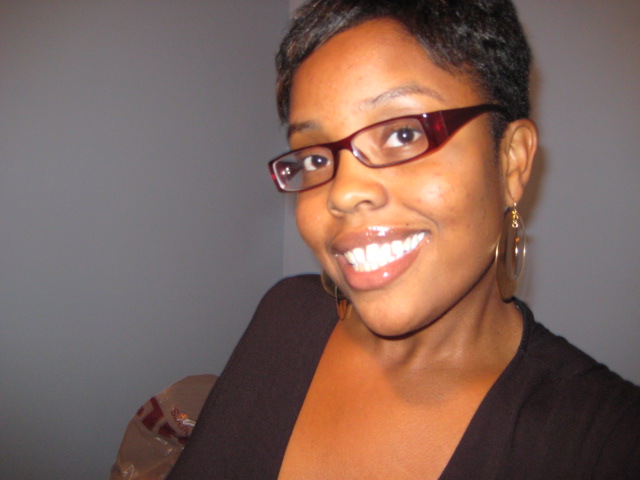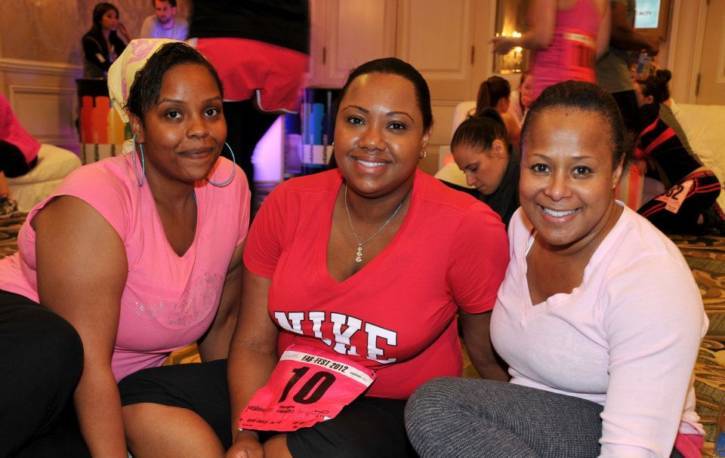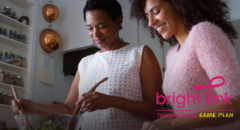 After losing her mother to breast cancer at 14 years old, Lorraine Gibson lived with the fear of the "pink elephant in the room," unable to speak about how the loss affected her or about breast cancer. Bright Pink, a national nonprofit focused on the prevention and early detection of breast and ovarian cancer, helped Lorraine get her voice back.
After losing her mother to breast cancer at 14 years old, Lorraine Gibson lived with the fear of the "pink elephant in the room," unable to speak about how the loss affected her or about breast cancer. Bright Pink, a national nonprofit focused on the prevention and early detection of breast and ovarian cancer, helped Lorraine get her voice back.
"Bright Pink gave me the confidence to have conversations with my family; gave me the confidence to have conversations with my doctors. It gave me the right questions to ask so that I can plan out preventative care and treatment," Lorraine said.
Lorraine is now an Ambassador for Bright Pink, using her voice to speak out about breast cancer, particularly to other women who are high risk.
She shared her journey with BlackDoctor.org in this Q&A.
BlackDoctor.org: Was the possibility of breast cancer something that was on your radar before your mother's passing? Was there a history of it in your family?
Lorraine Gibson: Before my mother passed away, breast cancer was somewhat abstract for me. I was about 10 years old when my mother received her initial diagnosis, so breast cancer was still rather vague for me. I remember my mother and my sister telling me, “Mama had to go to the hospital and have surgery to remove the cancer in one of her breast.” I remember being a little girl and hearing that my mother had to get a special treatment to help her cancer go away. A few years later, I began to understand that my mother had a mastectomy, which left a deep scar on her chest; and chemotherapy treatments that resulted in hair and weight loss. Prior to my mother’s diagnosis, as far as I knew, there was no history of breast cancer in our family. Breast cancer was not a topic that we discussed and I believe that it was a bit of a shock to my entire family. I didn’t quite know how to feel but I knew that life was changing. I knew that it was serious. Things became even more serious after the breast cancer came back after my mother had been in remission for nearly 4 years.
BlackDoctor.org: Walk us through life after your mom received her diagnosis.
LG: As I mentioned earlier, I was young when my mother received her initial diagnosis and I remember my family trying to keep life as normal as possible for me. My mother’s biggest concern was making sure that her girls (3 daughters and 1 granddaughter) were okay. Even though her appearance changed due to the mastectomy and the chemotherapy, she eventually went into remission. My family was relieved. My mother was a survivor.
For a while, things went back to normal. My mother gained healthy weight, her hair grew back and she went back to work. Life was good again! Then when I turned 14, things changed. We received news that the cancer came back and this time it was much more aggressive.
Sometimes it is difficult to explain how my mother’s health affected me. My sisters, my niece and I were mama’s girls. So watching her health decline was as if watching my Wonder Woman slowly lose her power. Over the course of the year, my mother became frail and physically weak. Eventually, she was unable to go back to work and the doctors said, “At this point, we want to make her as comfortable as possible.” Therefore, my father, my mother and my sister decided that it was time for mom to come home. We had a hospital bed set up in the living room of our two-bedroom apartment. I was a teenager, just starting my first year in high school, and every day I came home and saw my mother laying in a hospital bed. I held it together as best as I could in school but I was internally broken. I could not speak about it. I did not have the proper words to describe the pain I felt. I wanted life to be the way it used to be. But my mother was not getting better - she was getting worse.
I still remember the night that she died at only 45 years old. We were there with her, by her side, as she took her last breath. It was the worst night of my life. I remember screaming and collapsing to the floor. Although my family surrounded me, I felt scared, alone, and empty inside.
BlackDoctor.org: How did losing your mom to breast cancer impact your approach to health and wellness?
LG: For a while after my mother’s death, my approach was to deny, deny, deny. I didn’t want to think about breast cancer because it hurt too much, and since breast cancer stole my mother away from me, I was scared of it. Secretly, I believed it would become my own fate, and that I would have a similar experience as my mother. I was worried about my sisters. What would happen if I lost them, too? Breast cancer was “the pink elephant in the room”, don’t speak about it, don’t think about it and it won’t exist. But it did exist and I felt like it was a dark cloud over all of us.
It wasn’t until I connected with Bright Pink that I learned more about preventive care. The first step was learning how to talk about my family history and more specifically my mother. Her cancer diagnosis is a gut-wrenching part of my health history. I learned how to speak to my doctor about my concerns. I began a health care plan that involves early screening due to my increased risk based on my family history, living a healthier lifestyle, and eventually I underwent genetic testing. Most importantly, I learned that denying my family health history would not change it, nor would it change the potential impact that history had on my own health. I came to understand that denying it would not reverse the death of my mother and could even be dangerous to my health.

BlackDoctor.org: What types of questions should women ask their doctor, particularly when they have a family history of breast cancer?
LG: For me, asking my doctor for a referral for my first mammogram was the most difficult question. I dreaded this conversation because asking it made my mother’s death and my personal risk a reality. However, scheduling my first mammogram 7 years ago was an important step in my health care journey. I was nervous and scared but more importantly, I was taking care of my health and myself.
Bright Pink teaches women to visit a trusted healthcare provider at least once a year, even when we feel perfectly healthy, for an annual well-woman’s exam. At this visit or any other, your provider should take time to answer your questions, so be sure to come prepared! Bright Pink recommends women ask:
- What factors are increasing my risk of breast and ovarian cancer?
- Based on my personal risk level, what should my risk-reduction and screening plan include?
- What lifestyle changes can I make to reduce my risk for developing breast and ovarian cancer?
BlackDoctor.org: What has going through this journey taught you about yourself?
LG: This entire journey has taught me that my health is a priority. Yes, breast cancer is real and it is scary, but I learned I do not have to be passive - and honestly, I do not want to be. My journey has educated me. I prepare my questions before my doctor visits to help facilitate my conversation. I am sure to do my self-breast exams and so I am aware of my body and if I notice any changes/differences, I ask my doctor about them. I have learned to openly discuss my experiences. I have found more emotional stability in sharing my journey with other women. There are so many women with similar experiences as mine, they are just like me. These women have taught me so much and given me advice, support and confidence. I learned that I really am not alone, none of us are.









